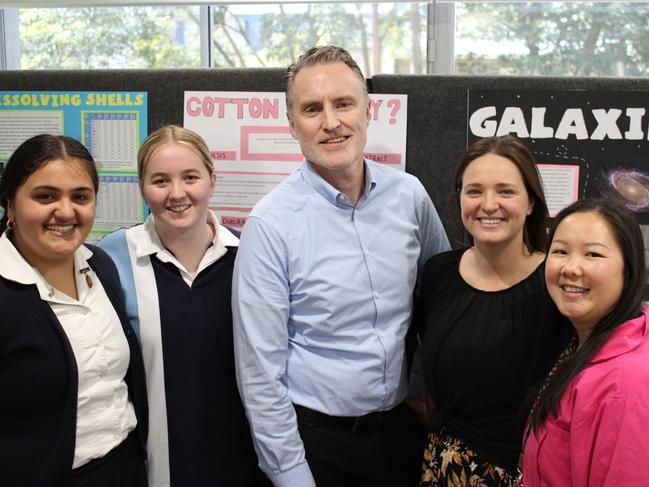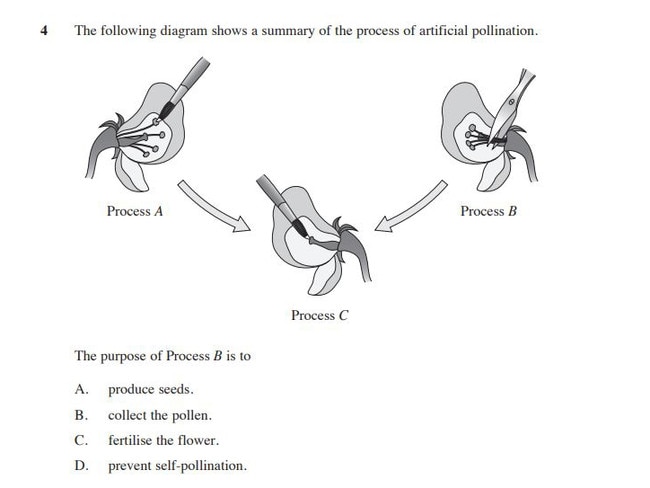HSC Biology 2024: Expert teacher reveals the exam question you should leave til last
Spanning eight topics over 240 hours, the Year 11 and 12 Biology course is often described as one of the HSC’s most ‘content-heavy’ subjects. Here are the tricks you need to ace it.

Education
Don't miss out on the headlines from Education. Followed categories will be added to My News.
Spanning eight ‘modules’ over 240 hours, the Year 11 and 12 Biology course is often described as one of the HSC’s most ‘content-heavy’ subjects, so you’ll need a few tricks up your sleeve to ace the exam.
The class of 2023 at St Vincent’s College were among the top performers in the state in the subject, punching above their weight for a non-selective school with 15 students achieving a Band 6 last year.
Instrumental to those results was head of the science department Chris Reynolds and his team of biology teachers, who have over the years identified the trickiest questions and taught students how to overcome them.
“(We) use RAP (Results Analysis Package) analysis of HSC results every year to identify areas of weakness (and strength!) in any particular examination,” Dr Reynolds explained.
“We then use this to inform our teaching, training students for success in these types of questions.”

Here’s Dr Reynolds’ expert advice.
WHAT MARKERS WANT
“Markers are following strict marking criteria and looking for the correct use of biological language,” Dr Reynolds says.
“It is essential that candidates address the verb and all parts of the question. Often if questions are read too quickly not all the parts are addressed, and this can have serious impacts on the marks that a student can access.
“Ensure that if a stimulus such as a graph, diagram or table is provided then it is referred to explicitly in the response.

“Often students miss that multiple examples are required – if a question asks for examples (plural), give at least two. Highlighting the components of the question during an initial reading will help students avoid missing these essential points.”
TRICKY TOPICS TO BE WARY OF
Dr Reynolds said while students will struggle most with topics “with which they have been less engaged”, certain subjects often prove particularly thorny, such as plant biology.

In the 2023 HSC, some students became unstuck tackling tricky multiple choice questions involving complex diagrams and graphs, including a question analysing the life cycle for a parasitic disease to prevent transmission to humans.
“Questions based on plant biology, for example, are often answered poorly as students cannot deliver suitable descriptions of processes or examples,” Dr Reynolds said.

“Data processing questions in which students have to apply content to unfamiliar scenarios can be problematic if students do not use information from the stimulus in their response.
“Careful practice of such questions – including the relevant application of specific science skills and scrutiny to marking criteria – is required during revision.”
NEXT STEPS TO STUDY UP
You might be tempted to ‘cram’ your Biology content and continue revising up til the minute you get into the exam room, but to get the best marks possible, Dr Reynolds recommends students focus now on developing a “consistent revision program featuring both the recall and application of content”.

• Tip 1: “Carefully consider the syllabus”. Make sure that all areas have been covered in depth, to avoid blanking on a topic in the exam room.
• Tip 2: Start at the beginning. “Thorough revision of earlier modules will also help as content from the first module taught can also contain material that has been forgotten.”
• Tip 3: Describe vs. explain vs. evaluate – know the difference. “Revision should also focus on a range of questions that test all the verbs, as each verb demands differing application of knowledge and skills.”
• Tip 4: Take past papers – and don’t skip the hard parts. “Practice the more problematic past paper questions that have been identified by your teachers. Real gains will be seen when students have familiarity tackling these more complex questions.”
• Tip 5: Get your work marked, even after the exam period begins. “Students must remember to seek feedback from their teachers on attempted responses right up to the day of the examination.”
TAKING THE TEST – AND NAILING IT
Good time management is key to performing well in the three hour HSC Biology examination – and ensuring you get to the end of the paper before the clock strikes zero.
“Prepare how you will manage your time by practising past papers under timed conditions,” Dr Reynolds advised.

“We suggest that the first thing students could do is read through the longer response questions which are awarded more marks. They then have these in the back of their minds as they are completing the rest of the paper.
“This gives them time to crystallise ideas before they attempt a response.”
While you won’t be asked to write a full English-style essay, the Biology exam often contains long response questions that will require you to sustain an argument – there’s a reason you get an extra sheet of writing space.
“When arriving at these questions, make a plan to structure a long response to ensure clarity and a good flow,” Dr Reynolds said.

“Students who struggle with skills such as graphing are advised to attempt these questions last as focus and accuracy is needed for such responses.”
And whether you start with the multiple choice or leave them til last, “careful re-reading of multiple choice questions is required”, Dr Reynolds said.
“Often the options are structured to catch students who have not read the question properly.”



